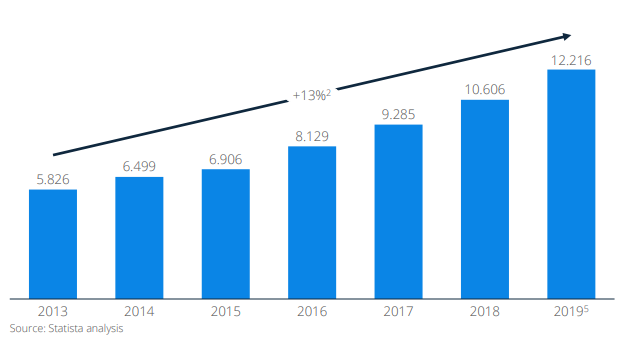8 Tips For Building A Successful International E-Commerce Business
Building a worldwide e-commerce firm is now easier than ever possible in today’s linked globe. You may extend your brand internationally and reach a worldwide customer base by using the appropriate tactics and methods. Entering foreign markets, meanwhile, necessitates rigorous preparation and execution. Here are seven crucial suggestions for creating a successful international e-commerce business to aid you in navigating this process: 
Conduct Comprehensive Market Research
Conducting thorough market research is essential before entering the world of online shopping. Learn about the cultural subtleties, consumer preferences, and purchase habits of the target markets you want to join. Determine the market’s needs, the level of competition, and the demand for your items. In addition to assisting you in comprehending the market environment, this study will direct your pricing strategy, product selection, and advertising efforts to properly meet the demands of each market.

Localise Your Website and Content
In order to successfully grow your firm internationally, localization is essential. Put your website’s content and product descriptions in the languages spoken by your target markets. Beyond translation, localisation entails tailoring your material to the cultural norms of the target audience. This includes utilising local measurements, currencies, and customer service in the native tongue. You may develop rapport and generate trust with potential clients by speaking directly to them. To make sure that your website and content effectively connect with them, you should also take into account conducting user testing and obtaining feedback from nearby clients.
Build Trust Through Secure Payment Options
In e-commerce, trust is crucial, particularly when conducting business internationally. Offer reputable and well-known payment methods in each target market. Think about combining well-known regional payment processors with more conventional choices like PayPal and credit cards. Giving clients a variety of payment choices improves their purchasing experience and gives them more faith in your company. To further reassure consumers about the security of their transactions, make sure your website is secured with SSL certificates and prominently displays trust seals. To keep customers’ trust, be sure to frequently monitor for and fix any potential security problems.
Select the Right Platforms

To effectively reach a worldwide audience, it is essential to select the appropriate e-commerce platforms. Choose the platforms that are most used in your target markets and build up a significant presence there. For example, if you’re wondering how to grow your Amazon FBA business, think about utilising the strength of Amazon’s international marketplace.
Investigate other localised marketplaces and social commerce platforms that are well-liked in particular nations. To maximise your global reach, adjust your strategy in accordance with the specific norms and regulations of each platform. To improve exposure and conversions, don’t forget to optimize your product listings and take advantage of platform-specific advertising tools.
Streamline Logistics and Shipping
For your organisation to be successful, efficient logistics and shipping are crucial. To ensure quick and secure delivery of your items, team up with reputable shipping companies with a global network. Calculate and display precise shipping charges upfront to protect customers from unpleasant surprises when they check out. Install order tracking programmes so that clients can follow the progress of their shipments. You may raise customer satisfaction and promote repeat business by offering a seamless shipping experience. To cut shipping costs and delivery times, think about building regional fulfilment hubs or using outside fulfilment services in important areas.
Customise Customer Support for Each Market
Regardless of where your consumers are located, offering top-notch customer service is essential. However, it’s crucial to tailor your support to each market when doing business worldwide. When responding to consumer questions and concerns, provide assistance in the native tongue while keeping cultural variations in mind. Employ local customer service agents or contract with companies that are experts in offering multilingual help. You can increase client loyalty and improve the perception of your brand by offering individualised and timely care. Utilise technology to offer effective support around-the-clock, such as live chat, chatbots, and localised self-help tools.
Foster Customer Loyalty through Personalisation
Your online firm’s long-term success depends on developing consumer loyalty. Personalisation is a powerful strategy for increasing loyalty. Consider each customer’s preferences and past purchases when creating marketing messaging and product recommendations. Create a seamless and individualised purchasing experience across all touchpoints by implementing personalised email marketing campaigns, rewarding devoted consumers with privileged discounts or prizes, and offering special discounts.
Utilise consumer data and analytics to learn more about the behaviour and preferences of your customers. This will help you produce focused and pertinent content that appeals to your global clientele. By doing so, you may promote repeat business and build brand ambassadors who will promote your company positively.
Embrace Cross-Cultural Marketing Strategies

Cross-cultural marketing techniques are used by prosperous multinational companies to appeal to a variety of customers. Make sure that each target market’s cultural values, preferences, and holidays are reflected in your marketing initiatives. Localise your advertising, make use of social media channels that are popular in each nation, and work with bloggers or influencers there. You may produce pertinent and compelling material that encourages conversions by establishing relationships and learning about the distinctive features of each culture.
Additionally, keep a close eye on the results of your advertising campaigns and tweak them as needed to maximise their impact in each area. In conclusion, it takes meticulous planning, research, and execution to create a successful international e-commerce firm. You can grow your company globally and establish connections with clients from around the world by heeding the above suggestions.
FAQs
Q: How can I determine the demand for my products in international markets?
A: Conduct thorough market research, analyze competitor strategies, and leverage online tools to assess the demand for your products in different countries. Additionally, consider testing the market with a small-scale pilot project before fully expanding.
Q: Should I use a third-party platform or build my own e-commerce website?
A: The choice depends on your business goals and resources. Third-party platforms offer convenience and established customer bases, but building your own website provides greater control and branding opportunities. Evaluate the pros and cons before making a decision.
Q: How can I optimize my website for international search engines?
A: Implement international SEO strategies such as optimizing meta tags, URLs, and content for relevant keywords in the target language. Localize your website content and consider using hreflang tags to indicate language and regional targeting.
Q: What are the best payment options for international customers?
A: Offer a variety of payment options that cater to the preferences of international customers. This may include credit cards, PayPal, local payment methods, and digital wallets popular in the target countries.
Q: How can I handle customer returns and refunds internationally?
A: Establish clear return and refund policies that comply with local regulations and are easily accessible on your website. Streamline the returns process and provide timely customer support to ensure customer satisfaction.
Q: How can I effectively market my international e-commerce business?
A: Develop a comprehensive marketing strategy that includes localized advertising, social media campaigns, influencer partnerships, and targeted email marketing. Leverage local market insights to create personalized marketing messages.
Conclusion
Building a successful international e-commerce business requires careful planning, market research, and a deep understanding of the target audience. By overcoming language barriers, establishing trust and credibility, and optimizing logistics and shipping processes, entrepreneurs can unlock the vast potential of the global e-commerce market. With the right strategies and dedication, you can take your business to new heights on an international scale.



